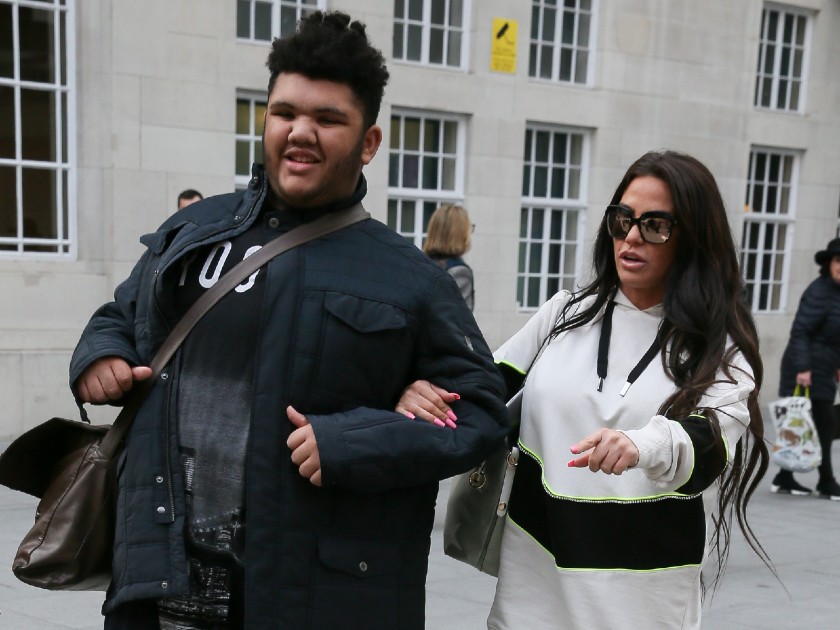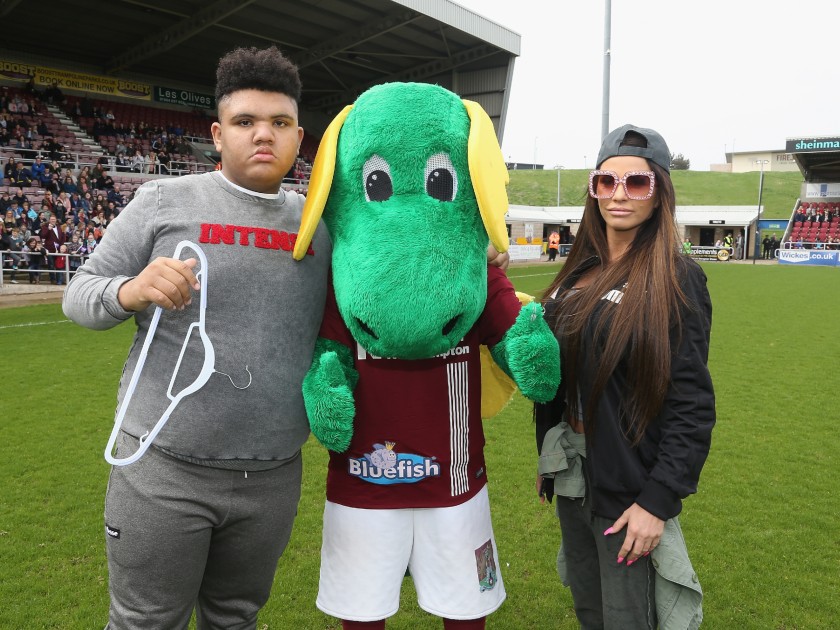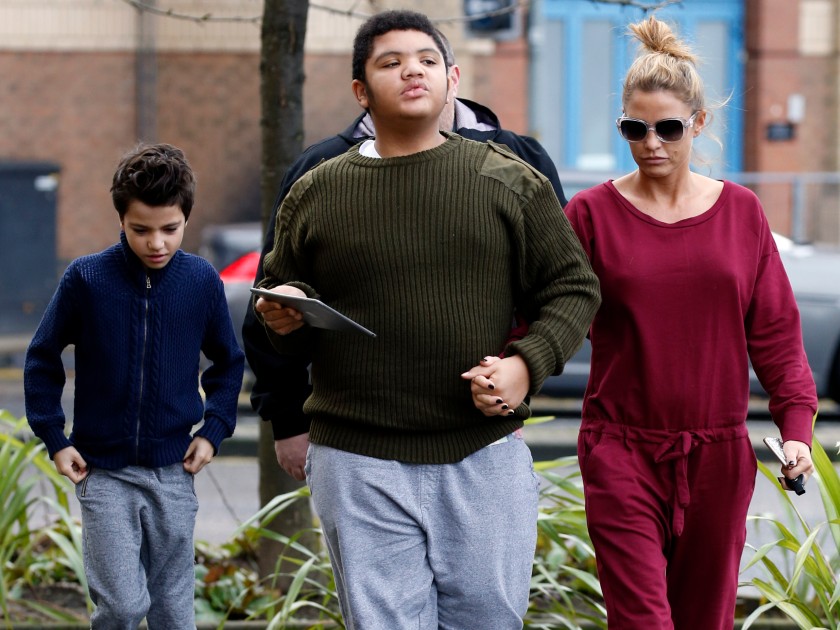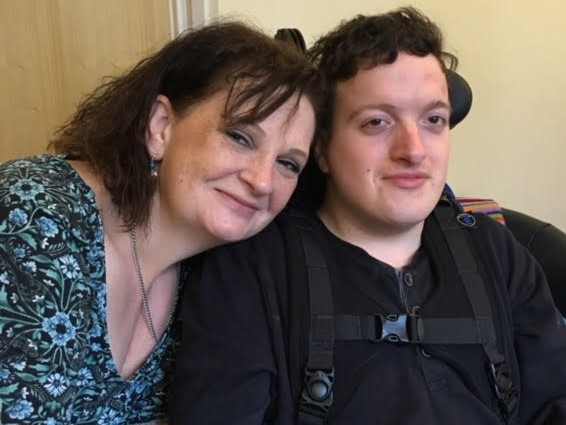Katie Price reveals ‘I just want Harvey to be happy and healthy’ as she prepares to send him to residential college

Katie Price, 42, opens up about her eldest son and the day-to-day difficulties they face together as he prepares to start residential college...
'As many will be aware, my 18-year-old son, Harvey, has Prader-Willi syndrome – a rare genetic disease that leads to excess eating and obesity [Harvey weighs 29st] – as well as autism.
I think, because I’m a celebrity, people have this idea that I have carers looking after Harvey but I don’t. I’ve been caring for him since the day he was born and I’m a very hands-on and dedicated mum.
For Harvey, every day is completely different. He’s very lovable and very funny, but he is unpredictable. There will be a day where Harvey won’t kick off at all, then there’ll be others where he can kick off at anything – although usually I can tell this is when he’s coming down with an infection.
Harvey has loved being in lockdown, because he gets to see me all the time and he doesn’t have to get dressed. He absolutely loves walking around in his pants all day and I love having him about too, but he’s got to do his school work and it’s tough. Homeschooling is hard work, but with Harvey it’s even trickier. Juggling his needs while getting him to do work isn’t easy.
I’m terrified of not being around for him. It’s awful, but I worry that if I go before him, he won’t cope. I know that he wouldn’t manage without me and it plays on my mind. I’m his everything and he wouldn’t understand why I wasn’t here any more. That thought breaks my heart.

As Harvey is now 18, and in his last year of school, we have started to look at residential colleges for him to go to after he finishes and I’ve found it really difficult. I know it’s important for him to gain some independence, have a social life, get friends and not just rely on me, but that doesn’t make the thought any easier. My relationship with Harvey is so special that the idea of letting go is almost too much to bear. But, as a mum, I have to do what is right for him and if I had my way, I know I’d baby him for the rest of his life. He’s 18 years old – he’s a man and so I’ve got to let him explore a bit.
Parenting advice, hot topics, best buys and family finance tips delivered straight to your inbox.
When we’re not in lockdown, Harvey’s in residential school during the week, and that’s the safest place for him because he can be so temperamental. If he’s at home, he often creates trouble in the morning, smashing things and refusing to go to school, but he does that because he doesn’t want to leave me. If he was away at college, he wouldn’t be tempted to do it because I wouldn’t be there.
So it’s really important to find the right college for him that he enjoys. Harvey’s happiness is everything and I am already talking up the next steps – telling him he’s ‘going to big man’s college’ and that he’ll have his own kitchen and bathroom. I want to get him excited. As long as it’s a home-from-home environment, he’ll be fine with me not being there.
Every day is a challenge, but I would do anything I can to make it the best for him. I’d be lying if I said that it wasn’t hard, but I’m used to it and I get on with it, because there’s no other way. Harvey needs me and it’s as simple as that. I’m not alone – there are lots of people in similar situations and my advice to anyone in the same position is to not give up. Be optimistic, talk to other mums and gain support from those who truly understand. There’s nothing to be ashamed about. Embrace your children, they’re unique.
Harvey is an amazing character, despite everything he’s been through. I love his banter, and how much he loves me. My wish? That he will stay healthy and always be happy.'

‘Caring for a disabled child is a constant battle’
Ruth Dalton, 54, lives in Rochester, Kent. Her son, Samuel, is 22.
'Like Katie, I’m a single parent to a disabled son, Samuel. When he was 17, he was diagnosed with a very rare genetic condition called Bainbridge-Ropers syndrome. There are only around 300 people globally who have this condition. Samuel was the 12th person in the UK to be diagnosed.
Samuel can’t walk or talk, and doesn’t really understand much about the world around him, but he’s a very loving person. He’s cheeky, affectionate and has a really good sense of humour.
During term time, Samuel is at a residential college in Surrey, where he’s learning to use his eyes as a form of communication. But when he’s at home, my days with him are non-stop, as he needs care around the clock, and I still have to hold down a part-time job as a mental-health administrator.
Either I or a carer – if we have one in – will do everything for Samuel, including hoisting him out of bed, washing and dressing him, as well as preparing his meals and medication. He can feed himself with a spoon, but cannot use a knife and fork.

Samuel doesn’t like to sit around watching TV; he likes to be doing things all the time, and learning, so we have to keep him occupied.
I don’t think people realise how much time it takes to care for a disabled child or young person. If I’m not actually caring for him, then I’m fighting cases for him through court, trying to get what he needs medically and educationally, as I can’t afford to pay for it all myself. I can’t always even afford to buy food and I’m wearing clothes I’ve had for 15 years!
Everything is a constant battle. Like Katie, I brought Samuel up mainly as a single parent. That’s difficult for anyone, but when you have a child with special needs, it is physically, mentally and emotionally draining, especially if you don’t have anyone to take over when you feel you can’t carry on and need a break. Nobody can imagine the effect it has on your mental health, unless you have walked in our shoes.
I’d love to be able to work full-time and for Samuel to be healthy and capable of looking after himself. But he will need me there all his life, and it scares me to think about what would happen if anything happened to me.
I don’t know what I’d do without him either. I remember when I was feeling poorly after surgery on my eye, and he sat next to me and patted me on the back as if to say, ‘It’s OK, Mum, I’m here.’ He is a kind, loving and gentle young man, and I’m proud to be his mum.'
‘Caring for a child with Prader-Willi can be very stressful’
Dr Philippa gives her advice to others in a similar situation to Katie and Ruth…
‘Prader-Willi syndrome is a rare genetic condition which produces a variety of symptoms, from learning difficulties and a persistent excessive appetite to behavioural problems. There is a lot of stress and strain in caring for a child with a syndrome like Prader-Willi, and doing it alone is even harder. Challenges include restricting access to food, because children with this syndrome will eat many times the same amount of food as other children, but due to the effects of the genetic changes will still feel hungry. They’ll also behave in extremely challenging ways to try to continue to access food. Stresses around managing multiple hospital appointments, appropriate schooling provision, financial burdens and far more all add to the load. If you’re in a similar position, make sure you are linked in with your GP and local social services to ensure you and your child have all the support available.’
Hayley is a Celebrity Features Editor with more than five years' experience in online and magazines. She currently looks after all things celebrity for Woman, Woman’s Own, Woman’s Weekly, Woman & Home, and Goodto.com. Before joining Future, Hayley spent a year as a TV reporter for Mirror Online and a year and a half as a showbiz and TV reporter for OK! Online - but was forced to write about tech and cars for a year before that, despite knowing nothing about either!.